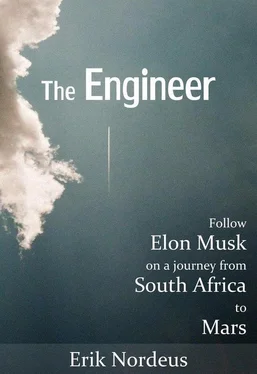In 1967, the crew of Apollo 1 practiced before a space mission. They were still on the ground, but they sat in the capsule on the top of a Saturn V rocket. “Got a fire in the cockpit,” a crew member reported at 23:31:04. The crew wore space suits, which made it impossible to get out of the small capsule before the fire had engulfed it. No one survived. The memorial plaque on the site where the accident happened says:
IN MEMORY
OF
THOSE WHO MADE THE ULTIMATE SACRIFICE
SO OTHERS COULD REACH FOR THE STARS
AD ASTRA PER ASPERA
(A ROUGH ROAD LEAD TO THE STARS)
GOD SPEED TO THE CREW
OF
APOLLO 1
One of the worst space related accidents took place in China. After the Challenger accident in 1986, NASA banned commercial cargo from the Space Shuttle. US satellite companies were now forced to launch satellites with either European or Chinese rockets. The Chinese government decided to lower the prices to about half of the European rockets because they needed the money. As money is often an important factor, several US companies decided to use the Chinese rockets only because it was cheaper. 183
The rockets launched from Xichang – a remote mountainous region of China close to the border with Burma and Vietnam. Several engineers from Western countries worked in the area to prepare the launch of their equipment. But they didn’t always believe it was a safe working environment. The Chinese workers were also concerned even though they never dared to say anything. 183
Because of the hilly terrain, pilots had to perform a dangerous corkscrew maneuver before they could land at the airport. When one westerner asked a Chinese worker if he often flew to the area, the worker replied with, “No. It is too dangerous.” They worked in a recently repaired satellite processing building where a rocket motor had ignited and started bouncing around inside the room. Shortly after liftoff, an earlier rocket had exploded above the launch pad only 3 miles [5 km] from their hotel. To avoid a similar close call accident, they were now forbidden to watch the launch from the roof of the hotel. 183
In February 1996, the US Intelsat-708 satellite on the top of the Long March rocket was scheduled to launch early in the morning. A US specialist wore his lucky shirt and put 2-yuan coins in his penny loafers for more luck. Because the number three is a Chinese lucky number, the launch was postponed to 3 AM.
All guests and staff were evacuated to a safer place, but the hundreds of residents who lived around the hotel were not evacuated. It was a party atmosphere so everyone were dressed in their best clothes. Other villagers were seemingly unaware of the launch. One sat in front of his house and wove a basket. 183“Because the launch time was at midnight after two o’clock, we discussed after dinner where we go to watch the launch,” a villager said. “The proposal was the roof of the hostel where it has better views.” 405
As the day turned into night, the clock turned 3 AM. The rocket launched. An onlooker described what happened after the launch.
“I got out, turned and ran around the building to my best viewing spot, in time to see the mountain lit from behind, hear the startling rumble and see the rocket emerge. But instead of rising vertically for nine seconds and several thousand feet I saw it traveling horizontally, accelerating as it progressed down the valley, only a few hundred feet off the ground. ‘Wrong way,’ I yelled, and for the next few seconds I was frozen in my tracks.”
“It arced toward the earth and I thought I knew what was coming, but the instant of horror that is burned into memory was not anticipated. A tremendous light turned 3 AM into noon. Every tree on the hillside was clear as a knife edge, and the sky reflected a weird glow, a color I can not describe. Many things happened at once. I heard the biggest explosion of my life, I turned and started to run. I saw a friend’s face contorted in Oh shit. I heard a smaller and then a larger boom, I left the ground, I was on the ground, scrambling, wondering why I was down there. I heard glass breaking and shit was flying everywhere.” 183
22 seconds after the launch, the rocket hit the ground just across the road from the hotel. The Chinese government claimed the villagers were evacuated before the launch, but the foreign personnel’s bus back to the hotel was mysteriously delayed by five hours. Everyone suspected that the Chinese wanted to clean up before they could return to the hotel. When they finally came back, they saw hundreds of Chinese soldiers working in the area. Eyewitnesses have later claimed how they saw trucks that transported human remains. 183“In my department, a classmate of mine died,” a villager said. “Two were seriously injured and nearly died. There were three or four cuts on his face. His neck artery was broken. The soldier pressed on the cut all the way to Xichang City where it was finally stitched.” 405
The official casualties were six dead and 57 injured. That’s a realistic number for the casualties among the technical personnel who worked with the launch. It’s impossible to say how many local villagers died. The numbers have been estimated by unofficial sources to be hundreds, which would make it the worst disaster in the history of rocket launches. 183
It was the rocket’s flight control system that caused the accident. But a Chinese military official had found another cause. “Everybody knows that when you light the rocket it goes straight up, so, obviously, outside influences had an effect,” he said. 183
No one said that it’s safe to launch rockets. “We choose to go to the Moon in this decade and do the other things, not because they are easy, but because they are hard, because that goal will serve to organize and measure the best of our energies and skills, because that challenge is one that we are willing to accept, one we are unwilling to postpone, and one which we intend to win,” the former US President John F. Kennedy said. 19
Space travel will always be a risky endeavor, but you need to take risks to move forward. “In the early days of aviation there was a great deal of experimentation and a high death rate,” Elon said. “We don’t want that – the public would not be accepting – but by the same token we can’t have a situation where no deaths are ever allowed, because that would put innovation in a coffin too.” 316
One of the astronauts who sat in the Apollo 1 capsule was Gus Grissom. A reporter asked him about the risks of flying a new spacecraft. “If we die, we want people to accept it,” Grissom replied. “We’re in a risky business, and we hope that if anything happens to us it will not delay the program. The conquest of space is worth the risk of life.” 352
The first man on the Moon, Neil Armstrong, got the question what he would do if the Lunar Module didn’t start again after it had landed on the Moon. “Well, that’s an unpleasant thing to think about,” Armstrong replied. “We’ve chosen not to think about that up to the present time. We don’t think that’s at all a likely situation. It’s simply a possible one.” 16
Armstrong was negative to SpaceX. Elon said it was a disappointing moment when a hero from his childhood didn’t encourage him to pursue his dream. “He has never spoken to us or visited us, and we’ve made many invitations,” Elon said. “I’m optimistic that he will visit us and learn more. We have a photo of the [SpaceX] launch signed by all the Apollo astronauts with the exception of Neil.” 316Unfortunately, Armstrong passed away in 2012 before he had a chance to visit SpaceX.
Читать дальше











